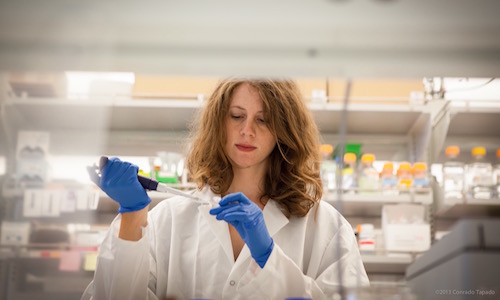Uncommon Thinkers: Ingrid Swanson Pultz devotes herself to improving lives through protein design
Editor’s note: This is part of a series profiling five of the Seattle region’s “Uncommon Thinkers”: inventors, scientists, technologists and entrepreneurs transforming industries and driving positive change in the world. They will be recognized at the GeekWire Gala on Dec. 12. Uncommon Thinkers is presented in partnership with Greater Seattle Partners. Read the profiles here.
When Dr. Ingrid Swanson Pultz was a graduate student working in a microbiology lab at the University of Washington in 2007, she loved her work, but she craved something slightly different. She wanted to build completely new things using biology.
Pultz spent her time at the UW and afterward on the cutting edge of protein design, a fast-moving field using state-of-the-art technology to develop new therapeutics, vaccines, biosensors, materials and more.
She became the first person to produce a tangible and applicable manufactured enzyme from Nobel Prize-winning methods. Along the way, Pultz bolstered the protein design ecosystem around her: she created a protein biological systems competition team at UW, she was the first translational investigator at the UW’s renowned Institute for Protein Design (IPD), and she continues to mentor those who have entered the field after she did.
Tackling celiac disease
It all started with iGEM.
Back in 2007, Pultz caught wind of the international competition for undergrads that challenges teams of students to create biological systems over the course of the summer. They present their work at the competition in the fall.
“I wanted to get involved,” Pultz said. But the UW didn’t have a team. So, she made one.
Creating the UW’s iGEM team and participating as an advisor for years changed Pultz’s life. It also changed the world of protein design.
In 2011, Pultz and fellow grad student Justin Seigel oversaw a team of undergraduates who wanted to tackle celiac disease, a disorder which makes it impossible for some people to process gluten. Together with help from Dr. David Baker, a 2024 Nobel Prize winner for his work in protein structure prediction and design, the team focused on how to use protein design to solve the problem.
Pultz and her team set out to design an enzyme that targeted only gluten. If it targeted other proteins, then the enzyme would break down everything else someone ate in their meal rather than only the gluten. Adding to the difficulty was creating something that could survive in the “harsh” conditions inside the human stomach.

“This was a really hard thing to do,” she said.
Using software from Baker’s lab called Rosetta, a next-generation protein structure prediction and design tool, the team started to develop an orally-administered treatment. They created an enzyme known as KumaMax. When they manufactured it, some variants actually started working.
With these findings, the team won iGEM that year. They were the first American team to do so in the competition’s history.
After the victory, the team published a paper on their findings and then the undergrads all went off to grad school. Seemingly, the journey was over.
But Pultz felt there was too much potential to shelve KumaMax.
She joined Baker’s lab as a postdoc and got to work. With funding from the UW’s CoMotion, Pultz focused on improving the enzyme’s “activity and specificity and manufacturability.” Soon, she joined IPD as the first translational investigator, a new position for scientists focused on commercializing technology.
“We did some really important studies that showed that the enzyme can break down gluten in various foodstuffs,” Pultz said. “We showed it in beer. We showed it in bread. We bought a cheeseburger and milkshake from Dick’s and degraded that and demonstrated that it works and in every case, it just drove the level of immunogenic gluten way, way down in these food things, and all under simulated gastric conditions in the lab.”
She and Seigel started a company, PvP Biologics, which worked out of the CoMotion Labs life sciences incubator.
“The goal was to bring this celiac technology through early stage clinical work,” Pultz said.
Through connections facilitated by the UW, Takeda Pharmaceuticals caught wind of PvP Biologics.
“We bypassed [venture capitalists] entirely,” Pultz said. “We went directly for a strategic deal.”
With funding from Takeda Pharmaceuticals, Pultz became the chief science officer and oversaw the early clinical trials of KumaMax. Three years later, before the pandemic in 2020, Takeda took over and bought PvP Biologics for $330 million. KumaMax is currently in phase two of clinical trials, meaning it’s one step closer to making gluten intolerance less intolerable.
Helping people in all stages
Now, Pultz is the chief technology officer at Mopac, another company born from the IPD and UW ingenuity. She’s devoted herself to protein design.
“There are a lot of problems that people encounter on a daily basis that can be solved with protein,” Pultz said. Health issues, environmental issues, and more can be addressed with manufactured proteins. “That is just tremendously exciting to be able to do that,” she said. “The applications are almost limitless.”

In the 10 years since Pultz made KumaMax, AI-based methods and machine learning methods caused “quantum improvements” in being able to make new proteins, Pultz explained. She was on the forefront of the biotechnology future.
For instance, KumaMax was the first tangible, applicable protein to come out of Baker’s Nobel Prize-winning methods. That Prize will be important in main-streaming this science for the public, Pultz said.
“I’m sure all the Nobel Prizes are given out because people do things that are really fundamental, that will touch people’s lives,” she said. “But I think that’s particularly true here and it really has the opportunity to touch people’s lives.”
Part of allowing protein design to live up to its fullest potential for Pultz is helping out others who are making companies of their own. She spends her time as an advisor at IPD as well as a mentor at Creative Destruction Lab (CDL), a program housed at the UW’s Foster School of Business that helps startups in computational health.
“I do really enjoy teaching,” she said. “I’ve done this a couple of times, so I can help them get that one step further. It feels good.”
Emer Dooley, a Seattle startup veteran and site lead at CDL, met Pultz when she was launching PvP Biologics. Now, Dooley watches Pultz as she advises the biotech startup leaders of tomorrow.
“She’s just deeply, deeply committed to helping people in all stages,” Dooley said.

